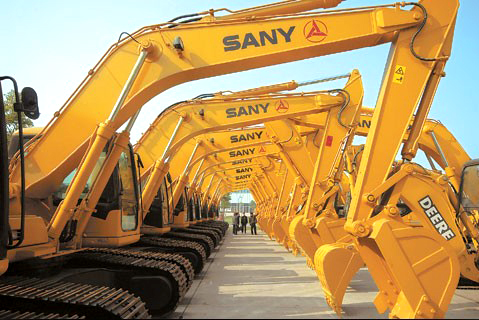Wuxi Yizhiling Locomotive Development Co. LTD , https://www.yizhilingev.com Benefiting from factors such as economic development, investment in fixed assets, and real estate boom, the construction machinery industry was once one of the fastest growing industries in China. It created a myth of wealth after another, but with the gradual increase in market saturation and the cost of labor. Dragged down by factors of production, the industry is facing the predicament of “opening and reversingâ€, and many companies are seeking transformation and upgrading, and have begun to switch to the after-sales service market.
Benefiting from factors such as economic development, investment in fixed assets, and real estate boom, the construction machinery industry was once one of the fastest growing industries in China. It created a myth of wealth after another, but with the gradual increase in market saturation and the cost of labor. Dragged down by factors of production, the industry is facing the predicament of “opening and reversingâ€, and many companies are seeking transformation and upgrading, and have begun to switch to the after-sales service market.
The industry entered the transition period According to the data of the third quarter of 2012, several major construction machinery industry companies, including Sany Heavy Industry, Zoomlion, Liugong, XCMG, Shantui, and Xiagong, and 6 major companies Quarterly revenue growth averaged 4.9%, and profit growth began to slow. In the first three quarters, only one company across the industry achieved double growth in revenue and profit. Daxie’s counterparts have the same bad days. This can be seen in the third Cross-Strait Machinery Industry Expo recently held in Longyan.
"Last year we also participated and signed several large orders, so we will continue to participate in this year's exhibition." Ye Ziliang of Quanzhou Hao Machinery Co., Ltd. told reporters that his company's main import excavators, bulldozers support wheels, guide wheels and various kinds of sales As for bushings and other products, the company's annual sales exceeded 8 million yuan last year, of which exports accounted for 25%, or about 2 million yuan, while exports were mainly in Southeast Asia. Ye Liangliang said frankly that at present the machinery industry market is not doing well. On the one hand, it is related to the overall economic situation. On the other hand, it is also due to the saturation of the industry market. “The self-positioning of companies is very important, and they need to recognize their strengths and strengths. Nowadays, many companies are paying great attention to the development of large customers, aiming at Taiwan and overseas markets, and exploring from the channel, while our company seeks to increase the market share of after-sales services. .
In the era of service competition and Ye Ziliang, the deputy chief executive Wei Jiamin from the Taiwan Metal Industry Research and Development Center also saw the dilemma of the development of the industry. He believes that the output value of Taiwan's metal machinery industry has shown moderate growth in the past 10 years. It is a very important part of Taiwan's manufacturing industry, accounting for about 30% of the total value of the manufacturing industry. The development trend is good, but the entire machinery industry is also facing how to "high value." And the issue of market saturation, that is, on the one hand to reduce costs, further increase product added value, realize "brand premium", and complete the transition from "OEM start" to "ODM housekeeping" to "OMS winner" competition mode; In addition, we must make breakthroughs in the development of new blue ocean markets in the existing markets and expand the scope of business services.
“At present, many bottlenecks faced by machinery companies are mainly channel issues. The fierce competition in foreign markets and the limited capacity in the domestic market make it a good strategy for the after-sales service market.†Liu Wenhua, a senior economist with headquarters in Nan'an, said that the metal machinery Products are used frequently and are easily damaged. After-sales service has become an important part of product competitiveness. “The construction machinery industry has entered the era of service competition. The quality of services is related to the survival of enterprises. Some well-known construction machinery companies in foreign countries such as Germany, Belgium, Japan and the United States all have a strong and complete industrial chain, in marketing, service and after-sales services. It is worthwhile to learn from other links to build a good profit model and form a sustainable development advantage."